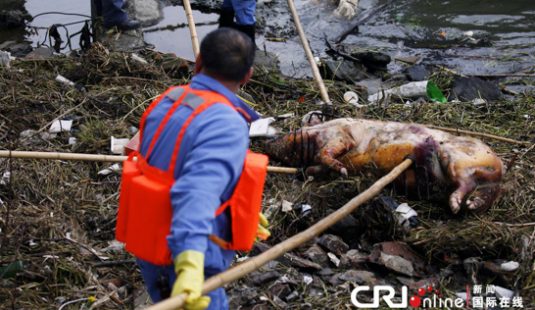“Officials say the water quality has not been affected and they are investigating where the pigs came from.”
For those wondering, no: This is not a story about piping-hot 馄饨汤 (pork dumpling soup). It is about a river. And the pigs in question? Long past their expiration date.
On Friday evening, reports of 900 1,200 pig carcasses dumped in the Songjiang section of the Huangpu River (just outside Shanghai) made the news, shocking residents of China’s second-largest city. According to Beijing Cream, city health officials determined “the pigs do not pose a health hazard, and the risk of E. coli is not much higher than normal.” The thought of ingesting bloated, fermenting swine is one thing – though Cthulu help the 22 million residents actually drinking or using tap water in Shanghai.
(The fact that this situation has heightened the E. coli risk to “not much higher than normal” is another matter all together.)

Retrieval and disposal of the more than 1,000 pig carcasses continues. (Image courtesy of CRJ Online and ministryoftofu.com)
Reports also indicate that officials “are investigating where the pigs came from,” as noted in the Independent (U.K.). Don’t you hate when 900 1,200 porcine bacon-makers mysteriously appear and suddenly die in your city’s major waterway? But thanks to coverage from the Ministry of Tofu, there’s no need to sugar-coat this sweet-and-(mostly)-sour pork:
“It is reported that since January, over 20,000 pigs have died in the neighboring rural villages. The mass death events have overwhelmed pig farmers as well as villages living in the area.”
Of the 50 million tons (110,231,000,000 lbs.) of pork produced in China each year, one must factor in a number of animals who just won’t make it, due to biological or disease-related reasons. In its reporting, the Ministry also noted that “Jiaxing Daily, a state-run newspaper circulated in Zhejiang province, disclosed Saturday…that 10,078 pigs died in January and 8,325 in February.” Just this month, “an average number of 300 pigs are killed each day.”
(While it’s unknown how many are slaughtered for meat and how many are “put out of their misery,” it’s safe to say that the recent conflagration in the Huangpu is probably not the best way to deal with an excess of unpalatable swine carcasses.)
But you have to hand it to Shanghai officials for doing their damnedest to make sure the “When pigs fly!” story stays believable. Reports the Independent:
“A statement posted Saturday on the city’s Agriculture Committee’s website says they haven’t found any evidence that the pigs were dumped into the river or of any animal epidemic.”
Clearly, all evidence points to a Noah’s Arc 2.0-type situation here. Luckily, Shanghai residents and Sina Weibo users alike aren’t buying the official line, and as reported by the Ministry, “are not only concerned about food safety and water quality being compromised by this incident, but questioning what caused so many pigs to die as well. Others worry that the government has been covering up the issue in the past few months.”
And pork is a porcine issue in meat-hungry China. Thanks to decades of famine and scarcity, a meal without meat in the modern-day Middle Kingdom doesn’t cut it. (Trust me: It’s impossible to eat around the meat. It is omnipresent.) Reports the Guardian (U.K.):
“I’ve heard people talking about eating meat in ‘revenge,'” [Cornell University sociologist Mindi] Schneider said. “It was so limited before. Now it’s like: ‘Look at this progress, we can eat as much meat as we want.'”
Apparently that means breeding, growing, and slaughtering enough pork to satisfy one-fifth of the world’s population. (Not that Americans are any more meat-conscious: The average American eats 276 lbs. of pork per year, compared to 132 lbs. by the average Chinese person.) If anything, this incident should bring to light the unsustainable nature of pork production and/or drinking water treatments in China’s cities.
But then again, who in Shanghai would turn down a nice hot bowl of 馄饨汤, straight from the faucet?
